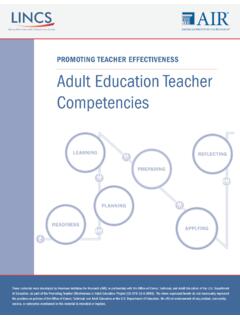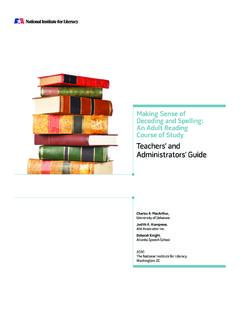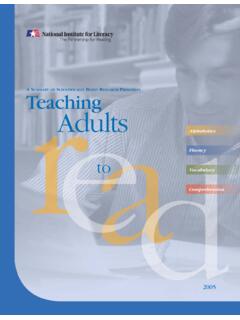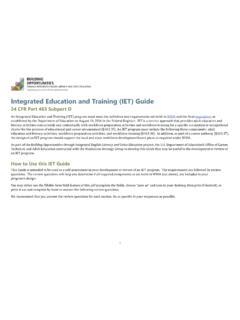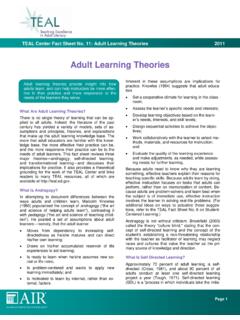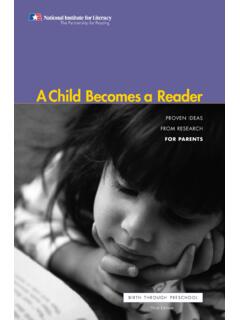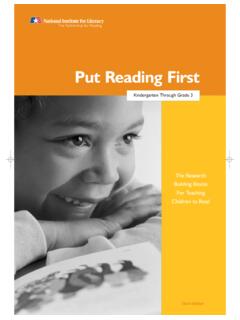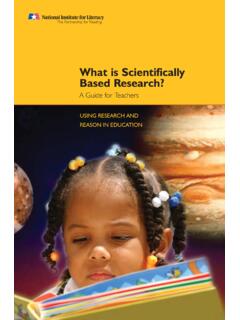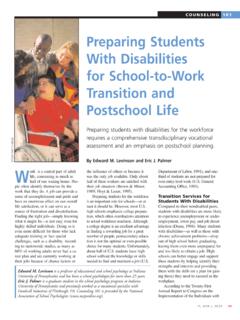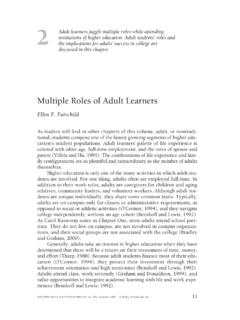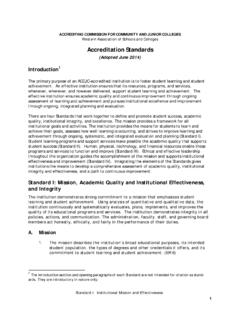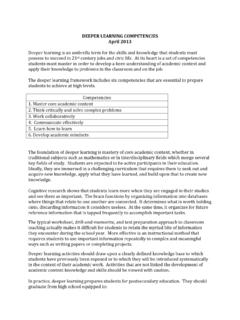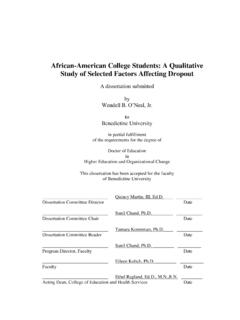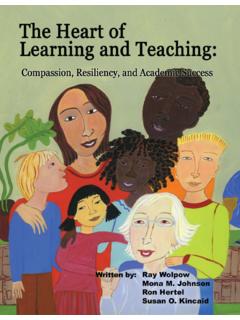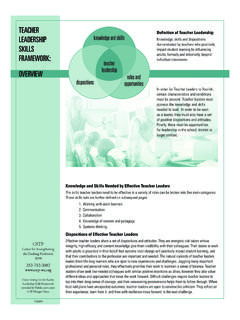Transcription of College and Career Readiness Standards for Adult Education
1 College and Career Readiness Standards for Adult EducationSusan Pimentel2013 This page intentionally left blank. College and Career Readiness Standards for Adult Education By Susan Pimentel Prepared by MPR Associates, Inc. Berkeley, CA Washington, DC Prepared for Department of Education Office of Vocational and Adult Education April 2013 This report was produced under Department of Education Contract No. ED-CFO-10-A-0117/0001 with MPR Associates, Inc. Ronna Spacone served as the Contracting Officer s Representative. The views expressed herein do not necessarily represent the positions or policies of the Department of Education . No official endorsement by the Department of Education of any product, commodity, service or enterprise mentioned in this publication is intended or should be inferred. Department of Education Arne Duncan Secretary Office of Vocational and Adult Education Brenda Dann-Messier Assistant Secretary Division of Adult Education and Literacy Cheryl Keenan Director April 2013 This report is in the public domain.
2 Authorization to reproduce it in whole or in part is granted. While permission to reprint this publication is not necessary, the citation should be: Department of Education , Office of Vocational and Adult Education . College and Career Readiness Standards for Adult Education . Washington, , 2013. This report is available at: iii CONTENTS v 1. Introduction .. 1 Overview of Project .. 1 Rationale for the Project .. 2 2. Applicability of the Common Core to Adult Education .. 5 3. Process of Selecting College and Career Readiness Standards for Adult Education .. 7 4. The Results: College and Career Readiness Standards for English Language Arts and Literacy .. 9 Key Shifts in the Standards .. 9 Key Features of the ELA/Literacy Standards Charts .. 10 5. The Results: College and Career Readiness Standards for Mathematics .. 44 Key Shifts in the Standards .. 44 Key Features of the Mathematics Standards Charts .. 45 References .. 85 Appendix A. In-Depth Description of the Selection Process.
3 89 Process Framework .. 89 Timeline of Deliberations .. 91 Appendix B. Connections Between Standards .. 95 Deliberate ELA/Literacy Redundancies and Repetition of Similar Content .. 95 Deliberate Selection of Mathematics Standards Repeating Similar Content .. 98 Appendix C. Rationales for the Selection of the Common Core .. 105 Rationales for the Selection of Standards for English Language Arts and Literacy in History/Social Studies, Science, and Technical Subjects by Domain .. 105 Rationales for the Selection of Standards for Mathematics by Conceptual Category .. 110 Appendix D. Understanding Text Complexity .. 117 Appendix E. Preparing students for Science, Technology, Engineering, and Mathematics .. 119 Appendix F. Biographical Summaries .. 125 Project Lead and Author, College and Career Readiness Standards for Adult Education .. 125 Mathematics Facilitators .. 126 ELA/Literacy Panel Members .. 127 Mathematics Panel Members .. 132 Appendix G. Stakeholders and the Common Core Writers.
4 139 This page intentionally left blank. v ACKNOWLEDGMENTS The success of the project and this final report would not have been possible without the support of many people. The author wishes to express her appreciation to MPR Associates, Inc. for their thoroughness in reviewing and preparing the report for publication and, in particular, Ruth Sugar, for her research support and dedication to all aspects of this project. Special recognition is due to Melanie Alkire, who provided ongoing mathematics content expertise to the work of the mathematics panel and tireless review of the mathematics Standards included in this report. The author would also like to thank Francis Skip Fennell, who provided content expertise and superb facilitation support to the work of the mathematics panel. In addition, special thanks go to the Common Core State Standards writers and the many stakeholders who reviewed the initial draft set of College and Career Readiness Standards and guided the panel in its final deliberations.
5 Finally, the author would like to convey her deepest gratitude to members of the English language arts and literacy and mathematics panels for their expertise and hard work to validate and recommend a set of College and Career Readiness Standards for Adult Education . Panel Members Gayle Box Associate Strategic Initiatives Kentucky Adult Education , Council on Postsecondary Education Frankfort, KY Donna Curry Senior Professional Development Specialist Tech Education Research Center (TERC) Cambridge, MA Robert Curry Associate Professor and Chair of English and Humanities Alfred State, State University of New York College of Technology Alfred, NY Mary Beth Curtis Director Center for Special Education Lesley University Cambridge, MA Margo Gottlieb Lead Developer World-Class Instructional Design and Assessment Consortium Wisconsin Center for Education Research Director Assessment and Evaluation Illinois Resource Center Arlington Heights, IL Arthur Heinricher Dean of Undergraduate Studies and Professor of Mathematical Sciences Worcester Polytechnic Institute Worcester, MA ACKNOWLEDGMENTS vi Lisa Hertzog Executive Director of Academic Support New York City Department of Education , District 79 Alternative Schools and Programs New York, NY Steve Hinds Mathematics Curriculum Developer City Colleges of Chicago Chicago.
6 IL Lorretta Holloway Program Advisor and Associate Professor Department of English Framingham State University Framingham, MA Joanne Kantner Dean Adult Education and Transition Programs Kishwaukee College Malta, IL Karen King Former Director of Research National Council of Teachers of Mathematics Reston, VA Henry Kranendonk Mathematics Specialist Educational Opportunity Program Marquette University Milwaukee, WI Miriam A. Leiva B. Cone Distinguished Professor Emerita Professor of Mathematics Emerita University of North Carolina Charlotte Charlotte, NC Meredith Liben English Language Arts and Literacy Team Director Student Achievement Partners Liben Education Consulting Hartland, VT Jane Meyer Adult Basic and Literacy Education Coordinator Canton City Schools Canton, OH Jane Roy Adjunct Instructor/Consultant South Dakota State University Brookings, SD Virginia (Ginny) Seltenright Academic Support and Compliance Manager Adult Education Services Arizona Department of Education Phoenix, AZ Barbara Van Horn Co-Director Goodling Institute for Research in Family Literacy College of Education The Pennsylvania State University University Park, PA 1 1 INTRODUCTION Overview of Project For over a decade, Standards -based Education has been an integral part of the Office of Vocational and Adult Education s (OVAE)
7 Program of national leadership activities to improve the quality of Adult Education and literacy programs nationwide. The Standards -based Education movement in Adult Education has resulted in communicating clearer expectations for students , using content Standards to improve curriculum and instruction, and creating professional development to help staff develop the expertise to implement Standards . Standards -based Education begins, of course, with the Standards themselves. Clear Standards allow educators to understand where to focus their efforts and shape overall instruction. Standards then are translated into curriculum and lessons for teaching the content of the Standards to students . Classroom activities, assignments, and a range of formative and summative assessments all help determine whether or not students are absorbing the essential skills and knowledge included in the 1 For more information on Standards -based Education in Adult Education , see A Process Guide for Establishing State Adult Education Content Standards (American Institutes for Research 2005).
8 Building on OVAE s long commitment to promoting state-level institutionalization of Adult Education content Standards , the central purpose of this effort Promoting College and Career Ready Standards in Adult Basic Education is to forge a stronger link among Adult Education , postsecondary Education , and the world of work. It presents a starting point for raising awareness and understanding of the critical skills and knowledge expected and required for success in colleges, technical training programs, and employment in the 21st century. While the academic Standards developed by states in recent decades reflected broad agreement among experts about what was desirable for students to learn, they did not necessarily identify what was essential for students to know to be prepared for the rigors of postsecondary training, work, or citizenship. It was not until the development of the Common Core State Standards (CCSS) in 2010 to date adopted by 46 states for K 12 programs that such a consensus emerged.
9 Based on evidence from a wide array of sources, including student performance data, academic research, assessment data, and results of large-scale surveys of postsecondary instructors and 1. INTRODUCTION 2 employers, the CCSS offer clear signposts indicating what is most important for College and Career Readiness (National Governors Association [NGA] 2010b, 2010c, pp. 91 93). Thus, the CCSS were selected as the basis for the review and recommendations in this report. The report describes how these College and Career Readiness (CCR) Standards can enable Adult Education programs to establish a framework for developing or updating their Standards . The following questions guided the review: 1. What content in the area of English language arts and literacy (ELA/literacy) is most relevant to preparing Adult students for success in higher Education and training programs? 2. What content in the area of mathematics is most relevant to preparing Adult students for success in higher Education and training programs?
10 3. Which Standards in each content area are most important for Adult students ? In Sections 4 and 5 of this report, state administrators and instructors will find a set of CCR Standards that reflect the answers these questions generated. It is important to note that this report does not specify a required set of national or federal Standards ; rather, it provides benchmarks aligned to the CCSS for states to consider in creating or evaluating their own Adult Education Standards . Rationale for the Project The importance of College and Career Readiness for Adult students cannot be overstated. Increasingly, students entering the workforce are discovering that they need critical knowledge and skills that are used on a regular basis. They recognize that pursuing a Career pathway that pays enough to support a family and provides genuine potential for advancement hinges on being able to perform the complex tasks identified by the CCSS as critical for postsecondary success .
